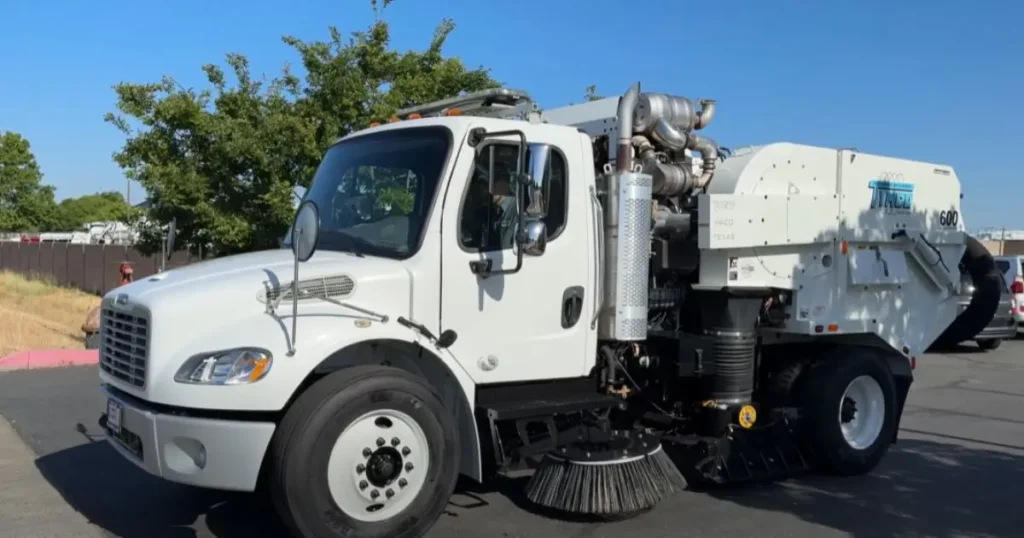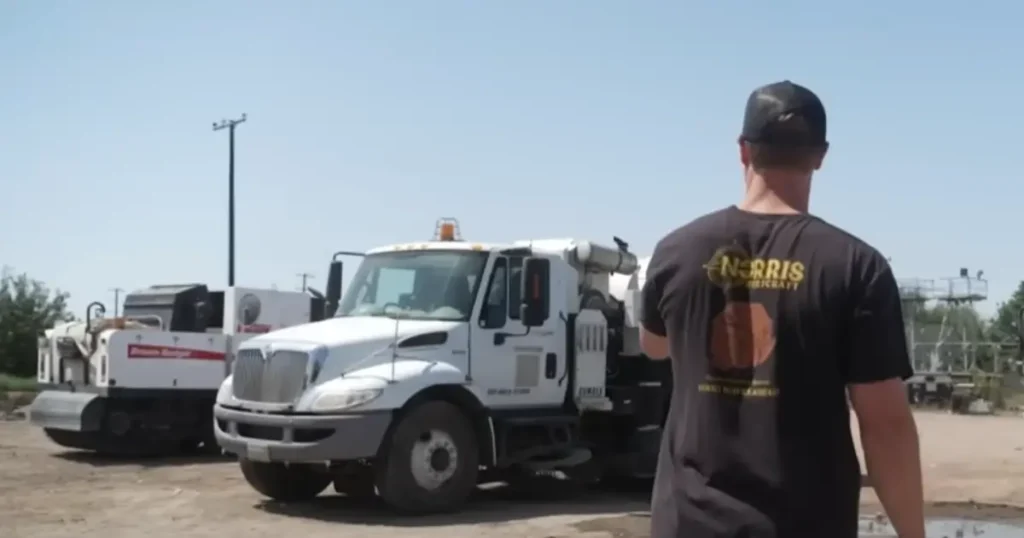Brandon’s story is one anyone dreaming of breaking out of the 9-to-5 grind or taking a leap into entrepreneurship should hear. Imagine shifting gears entirely at 31 and jumping headfirst into a business you know nothing about. That’s exactly what Brandon did when he bought a street sweeper business—and he’s since grown it to generate hundreds of thousands in revenue annually.
This isn’t your typical rags-to-riches story, nor is it one driven by sudden inspiration or lifelong ambition. Instead, Brandon’s journey into the world of street sweeper business is about discovering a low-competition, high-demand niche, learning the ropes from the ground up, and applying a practical approach to build wealth without reinventing the wheel.
Let’s break down Brandon’s story and explore how his journey can serve as a blueprint for anyone considering a career shift, especially if you’re considering owning a small but highly profitable business like street sweeping.
Table of Contents
Discovering the Street Sweeper Opportunity
Brandon was far from your typical business guru. He was a former baseball player with little knowledge of business and no experience in street sweeping. His interest in the industry started from a podcast he listened to on a whim. The host of the podcast described the Street Sweeper Opportunity as an “evergreen” service industry with recurring revenue and minimal overhead. The episode got Brandon thinking: What if the street sweeper business could be his gateway to financial freedom?

Before he purchased his business, Brandon was itching for a change and looking for a way to build his future on his own terms. So, when he came across an older street sweeper business owner who wanted out, he saw his chance. The owner was a 75-year-old man who was ready to retire, and he was open to a straightforward transaction. The business, with an aging fleet of trucks and a small roster of clients, was valued at $100,000 to $150,000.
After a bit of negotiation, he bought the company for $60,000, with all the financing taken care of by the seller. Brandon would pay $2,500 monthly for five years and was instantly the owner of a street sweeper business.
With no industry knowledge and limited Street Sweeper business experience, Brandon took the risk, figuring that even in the worst-case scenario, he would only be down $60,000. At best, he’d own a successful business. And as it turns out, his leap of faith paid off big time.
Starting Small but Growing Fast
Brandon’s new street sweeper business didn’t take off immediately. In the first month, the company generated about $15,000 in revenue, but he didn’t stop there. Through hard work, strategic planning, and a few smart hires, he managed to scale the business. Fast forward to today, and Brandon’s company pulls in $75,000 each month. Annually, they’re on track to make between $650,000 and $800,000. Not bad for a business that once did a fraction of that.
The Equipment: An Essential Part of the Street Sweeper Business
For those unfamiliar, the street sweeper business is reliant on specialized equipment. Brandon’s company has six trucks, with four of them running regularly. Initially, he didn’t have all the knowledge on truck costs, but a quick Google search gave him some insight. Depending on the type, street sweepers cost anywhere from $15,000 for an auction buy to $150,000 for new equipment.

By buying used and refurbished vehicles from auctions, he managed to expand his fleet on a budget. His six-truck fleet now runs four vehicles consistently, with two as backup.
Another key insight was about maximizing time and effort. Street sweeping doesn’t require a high number of employees, making it easier to manage. Brandon runs the business remotely from Arizona, while the trucks operate in Oxnard, California. With two drivers, a mechanic contractor, and a remote operations manager, Brandon has kept his staff lean without sacrificing service quality.
The Genius of Recurring Revenue and Customer Retention
Street Sweeper is a steady business, thanks largely to its recurring revenue model. Many clients are on long-term contracts, providing Brandon with consistent cash flow and enabling him to focus on growth rather than client acquisition. Even better, the business is relatively low-stress compared to other industries since clients generally require regular, predictable service.
Brandon knows the importance of customer loyalty. To maintain high customer satisfaction, he established a simple but effective strategy: if his drivers see a pothole or any other maintenance issue while on the job, they notify the client. This small extra step has helped build trust and rapport, encouraging clients to stick around and even expand their service requests. From asphalt repair to pressure washing, Brandon’s team now handles a range of pavement-related jobs, all through subcontractors, with Brandon taking a cut.
How He Made the Competition Work for Him
Brandon’s competitors fall into two categories: big private equity-backed companies and smaller mom-and-pop operations. The big companies aren’t interested in small contracts, and the smaller businesses are often limited in their ability to grow or take on additional work. This leaves a nice “middle ground” for Brandon’s company to capture local clients who need reliable service but don’t want to pay premium prices.
For Brandon, this positioning means less price competition and more room to grow without the looming threat of being out-competed. In his words, “I’m small but hungry, so I can take opportunities from both competitors.”
Thinking Beyond Sweeping: Expanding Revenue Streams
One of the standout aspects of Brandon’s approach is his commitment to saying “yes” to almost any request from a customer. If someone asks for a service his team doesn’t currently provide, Brandon finds a way to offer it, often by subcontracting to specialists and taking a percentage.
For example, he had a client who needed parking lot sweeping services and pressure washing. Brandon subcontracted both jobs, making a profit while expanding his service offering without any extra work on his part. This willingness to adapt and innovate has been crucial to the company’s growth and success.
How to Start Your Own Street Sweeper Business
If you’re considering starting a street sweeper business, you could buy an existing company like Brandon did or start from scratch. For those starting fresh, you’ll need an initial investment of around $50,000 for smaller jobs with simpler equipment or up to $200,000 for larger trucks suited for bigger projects. Financing options may be available, but remember, without a business history, you may need a solid credit history or personal assets as collateral.

If buying a business, research the current contracts, client base, and equipment. The beauty of this industry is that you’ll rarely have a lot of customer turnover since street sweeper services are always needed.
Why Street Sweeper Businesses Are a Smart Bet
While it may sound like a small niche, the street sweeper industry has some advantages that make it a solid business choice:
- Recurring Revenue: Street sweepers work on contracts, so they have consistent, recurring income. This provides stability.
- Remote Management: Brandon lives in Arizona while his business operates in California, proving you don’t have to be on-site to manage the day-to-day.
- Small Team, Big Impact: With just a few full-time employees and contractors, Brandon can keep his operations lean and costs low.
- Low Competition: Street sweepers operate in a unique niche, and there aren’t many companies around, especially those targeting smaller contracts. This allowed Brandon to operate without many competitors.
A Simple Business Model That Pays Well
The key to Brandon’s street sweeper business is its simplicity. For example, here’s how Brandon breaks down his costs and profit per job:
- Average Job Charge: $740
- Cost per Job: $300
- Jobs per Day: 2
- Working Days: 5 per week
With two jobs a day, the company could bring in around $1,480 daily, or $385,000 annually with just one truck. As the company grew, so did the earnings, and adding new trucks only made the business more profitable.
Scaling Up and Expanding Services
With Brandon’s approach, every new customer becomes a stepping stone for the next. Each contract adds to the company’s growth, and every time they renew a customer’s contract, the company’s valuation increases. That’s part of what makes street sweeper businesses valuable: long-term customer contracts and the potential for additional services.
For Brandon, each customer is worth approximately $6,000 a month, and he aims to grow that number as the business scales. The recurring nature of contracts also means that as his customer list expands, so does the security of his business.
Conclusion:
Brandon’s journey from baseball to street sweeper owner is a testament to how unconventional business paths can lead to success. With no previous experience, he took a chance on a street sweeper company and built it into a thriving business in under two years. The industry’s stable revenue model, paired with minimal competition and a need for recurring services, makes it a lucrative choice for anyone willing to get into a unique niche.
If you’re looking for a business model with low overhead, flexibility, and growth potential, the street sweeper industry could be your next big opportunity.
For more articles on business success and helpful tips, explore our Success section.

